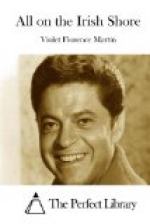The manner in which Mr. Alexander dispersed this entertainment showed that he was already equipped with one important qualification of a Master of Hounds—a temper laid on like gas, ready to blaze at a moment’s notice. He pitched himself off his horse and scrambled over the bank into the covert in search of his hounds. He pushed his way through briars and furze-bushes, and suddenly, near the middle of the wood, he caught sight of them. They were in a small group, they were very quiet and very busy. As a matter of fact they were engaged in eating a dead sheep.
After this episode, there ensued a long and disconsolate period of wandering from one bleak hillside to another, at the bidding of various informants, in search of apocryphal foxes, slaughterers of flocks of equally apocryphal geese and turkeys—such a day as is discreetly ignored in all hunting annals, and, like the easterly wind that is its parent, is neither good for man nor beast.
By half-past three hope had died, even in the sanguine bosoms of the Master and Mr. Taylour. Two of the farmers had disappeared, and the lady bicyclists, with faces lavender blue from waiting at various windy cross roads, had long since fled away to lunch. Two of the hounds were limping; all, judging by their expressions, were on the verge of tears. Patsey’s black mare had lost two shoes; Mr. Taylour’s pony had ceased to pull, and was too dispirited even to try to kick the hounds, and the country boys had dwindled to four. There had come a time when Mr. Taylour had sunk so low as to suggest that a drag should be run with the assistance of the ferret’s bag, a scheme only frustrated by the regrettable fact that the ferret and its owner had gone home.




